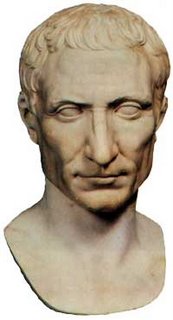March 15, 44 BCE

This is is the date of the Ides of March of the year 44 B.C.E. It is also the date of the most famous magnicide of the ancient world. That day, Gaius Julius Caesar was murdered in the Roman Senate by a group of senators who desagreed with his ideas. The assassination by itself did not change history, it probably only delayed for a couple of years what was inevitable: the transformation of the Roman Republic in the Roman Empire.
During centuries, since 509 B.C.E., the Roman system of government, was the Republic, which means "things of the people". The balance of power was divided between the consuls, who were yearly elected (two of them each year), the Senate, the tribunes, other different assemblies, and the Pontifex Maximus. As the Roman territory grew beyond the Italian peninsula, the system started to show signs of stress. These were social, political and military in nature, most of the consequence of the use of a system intended to hanldle more a city-state than a large territory. In 133 B.C.E, reform was clearly needed, Tiberius Gracchus tried to pass them, but the extremely conservative Senate did not allow it. Not only that, but political violence was inserted as one of the tools to deal with problems within Roman politics, Tiberius Gracchus and his followers were murdered.
Many historians, believe that the Republic had its death sentence in 133 B.C.E. From then onwards, political instability, civil war, growing external threats and a disgruntled middle class undermined the Republican system of government to the point that Caesar could appear as a solution by concentrating power within himself. He became Pontifex Maximus and Dictator. The conservative senatorial faction, which was upset about the loss of traditions that were kept for centuries, plotted his murder. This did not change the trend. The Republic was not reformed, civil war continued and the Liberators were defeated in Phillippi by Marcus Antonius and Octavian(42 B.C.E.). Although the point of no return was probably crossed in 133 B.C.E, Octavian (Augustus) was not titled as Princeps (first citizen) and Imperator (a military honor of the victorius and powerful) until 27 B.C.E in order to establish the Principate, i.e., the Roman Empire.















3 Comments:
I can remember so vividly standing in front of a room full of people reciting the words “Friends, Romans, Countrymen – lend me your ears… I come to bury Caesar not to praise him. The evil that men do lives after them… the good is oft interred with their bones – so let it be with Caesar…”
I could go on but I am sure you’ll thank me to stop there…
Not al all, Amy, you are weolcomed to say anything you want, if you wish...
I'll take you up on that Marco - cause I can't help but say ((the soothsayer say - beware the ides of march))
(smile)
Post a Comment
<< Home